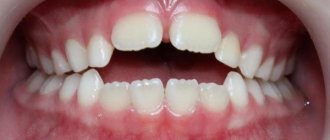Qualified assistance will be provided by a professional speech therapist-defectologist. During the initial examination, the specialist will determine the reasons why speech is delayed and suggest methods of correction.
Reason 1. Individual pace
Of course, every child is unique and must develop on their own schedule. If your baby went a month earlier than your neighbor’s son, but said the word “mom” a few weeks later, there is nothing wrong with that. Everyone has their own pace.
This delay in speech development is called tempo. With a slight delay, everything will return to normal and the child will develop his ability to speak in the same way as all children.
Just pay attention that experts “allow” only a slight lag from the norm to be attributed to individuality. Be careful!
What to do if he doesn't speak?
- Do not put pressure on the child.
- Constantly provide information to the child.
- Communicate with your child on any topic.
- Do not lisp and pronounce words clearly.
If the baby does not speak at all or does it poorly, there is no need to constantly ask him to say something, especially contact him with the word “tell.” Most likely the child cannot say something and hardly wants to. That is, he wants to, but he can’t.
It is important to remember that:
- Some walks, starting from 3-4 months, should be in the wakefulness interval.
- An adult should comment on some of the actions, but not like a radio, but if he were telling a 3-4 year old child. For example: “Let’s go have lunch and then go for a walk.”
- From birth we conduct a DIALOGUE with the child, not a monologue. That is, we give a pause and wait for an answer from the child, even if this does not happen. Someday he will definitely answer, be patient.
The most important thing is to praise the child if he himself simply uttered a word, sound or syllable, even if there are mistakes and it is not clear, he is still doing well because he is trying. It is also important to maintain a conversation when a child tells you something, even in his own childish language, but he must see feedback, interest, that mom and dad understand him, even if this is not the case. "Wow! Is it true? That's the story!" - this will be enough for a wave to maintain a conversation with the baby.
Reason 4. Bilingual family
Bilingual children “have the right” to begin to speak with some lag behind the norm. Hearing different languages spoken around them, they find themselves in a more difficult situation than their peers who only need to master one language.
In order to correctly construct speech, a child needs to separate one language from another. This requires some time. So it is quite possible that there is a delay in the onset of speech formation, the absence of common sentences, and errors in the grammatical construction of phrases.
Why doesn't he speak?
In fact, “does not speak” is a rather loose concept. Let's give examples.
- The child does not utter any words at all, not even “yes” and “no.” For a 1.5 year old this is normal, but for a 4 year old child this is already a problem.
- Doesn't speak sentences. For 2.5 years it will be the norm. At 4 years old you already need to worry.
- The child understands spoken speech, fulfills requests and instructions, regardless of complexity, but does not speak.
- The child talks a lot, but in “his” language.
- The child speaks, but those around him do not understand him, because he replaces many sounds.
That is, in each situation the concept of “does not speak” will be different. And here it is important to understand the reason, find an approach and correct it. In some cases, it is possible to involve more specialized specialists.
It is important to understand that in the process of speech formation, understanding it is more important than pronunciation.
Reason 5. Stress, unfavorable psychological environment
Unfortunately, stress affects not only adults, but also children. Severe fear, an uncomfortable psychological climate in the family, even quarrels between parents can cause a delay in speech formation. Children need calm, positive emotions and a reasonable daily routine.
Strong experiences, fear, and psychological trauma can lead to stuttering and delayed speech and mental development.
Separately, it is worth highlighting the problem of “hospitalism” in children. Absent speech syndrome caused by separation from family in institutionalized children is associated with both psychological stress and communication deficits. Unfortunately, cases of this syndrome also occur in domestic children. Formal child care without established communication, love and attention from loved ones provokes developmental delays.
What is ZRR and how does it manifest itself?
SRD is a delay in speech development. In order to suspect that a child has a developmental disorder, certain signs must be present.
- At 12 months: little babbling, the child is quiet.
- At 18 months: does not understand his own name, the names of surrounding objects, or the calls “come here”, “sit down”.
- At 2 years old: uses individual words in a limited number, does not try to repeat words.
- At 2.5 years: does not know the names of body parts, environmental objects; upon request, cannot name an object or bring something within sight; cannot form simple two-word phrases, for example, “I’m hungry.” Often the child is misunderstood.
- At 3 years old: does not speak simple sentences (subject, predicate, object), does not understand simple explanations or stories about events in the past or future.
It is worth noting that a significant delay in speech development is typical for children with general developmental delay.
That is, in most cases, the fact that a child does not speak does not mean the presence of SDD.
The diagnosis of SDD can be temporary, for example, when a child at 2 years old speaks less than 50 words. This diagnosis will be temporary and means that a healthy child has minor speech problems and all that is needed is to talk to the child more.
Reason 11. Alalia
This term means primary underdevelopment of speech centers. Occurs as a result of damage to the cerebral cortex during early infancy or fetal development. This condition is described in more detail in the article about alalia.
Let’s just say that you won’t be able to cope with alalia on your own; be sure to seek help from specialists.
Also check if your child has echolalia.
Who needs examinations?
Examinations are needed if the doctor suspects a child has speech development delay (SDD). Not all children who do not speak have this delay and not all children need testing.
If RRR is still suspected, then the following examinations are necessary.
- Examination by a pediatrician.
- Examination by a neurologist.
- Examination by a psychiatrist (included in the medical examination of children 2 years old).
Research carried out according to indications.
- Electroencephalogram (EEG and sleep monitoring. In very rare cases, a child experiences developmental regression and this is associated with a large amount of epiactivity on the EEG during sleep, when the child does not have epileptic seizures.
- MRI.
- Genetic tests.
- Examination by an audiologist, audiometry,
- Acoustic Spectrum Disorder Test.
Digestive system
The digestive system develops along with the body. On the one hand, it grows, matures, learns to digest new types of food. On the other hand, it must not only grow, but also through its work provide nutrition to cells and tissues with building materials and energy, as well as remove waste products. There are many more functions that the digestive system influences indirectly.
There can be many reasons for “indigestion” in a child. But it is important to remember that the main processes of food digestion occur in the small intestine with the participation of the pancreas. It is she who secretes the necessary enzymes that break down food into its component parts2. When, for various reasons, there are not enough digestive enzymes, food may not be completely digested, which often leads to symptoms of “indigestion.”
What can lead to “indigestion” in a child?2
- overeating, a sharp increase in load against the background of a favorable general condition;
- violation of the diet with obvious restrictions on any products;
- new products that the child tried for the first time;
- intestinal infections, poisoning, their consequences;
- use of antibiotics and other drugs;
- congenital characteristics, allergies, intolerance to certain foods;
- stress and emotional overload.
As many reasons as there are, there are just as many manifestations of digestive disorders.
The main symptoms of “indigestion” in a child:2
- heaviness in the stomach;
- discomfort after eating;
- bloating;
- flatulence.
If the digestive processes are disrupted for a long time, this can also manifest itself as diarrhea and even weight loss due to lack of nutrients.
Norms of speech development in children
Speech development occurs gradually. Each child is individual, so he can either be ahead of age norms or a little behind. Girls are thought to start talking earlier than boys, and parents of boys don't always know whether to worry or just wait. The reason is physiological characteristics: the maturation of some brain structures in girls occurs faster. Because of this, they develop better vocabulary at an early age. But not only the number of words, but also other signs are important for assessing a child’s speech development. They are universal for both boys and girls.
The speed and quality of speech development in children is individual, and normative boundaries are arbitrary. Your pediatrician will help you understand that everything is fine with your baby. To make a preliminary assessment of speech development, you can focus on the norms described by the Soviet psychologist Lev Semenovich Vygotsky [1].
Up to a year
In the first months of life, the baby listens to his parents and the adults around him. He distinguishes the voices of people talking to him and turns his head towards the sound. First, the child masters vowel sounds, then by three to four months, consonant sounds appear, and the baby begins to roar.
At the age of 6–12 months, the child more actively imitates the sounds of adult speech. Babbling appears - the baby pronounces the same syllables, for example “ma-ma-ma”, “pa-pa-pa”, “dya-dya-dya”. At about ten months, children get used to responding to their name. By the age of one year, the child appears the first short meaningful words (“na”, “give”, “mom”). Vocabulary ranges from 3 to 20 words. In addition, a child of this age correctly responds to requests to show or give something (does it or shakes his head negatively).
From one year to two years
At one year old, the baby repeats words that he often hears, and adjectives appear in his speech. The child uses sounds and gestures to attract attention, skips or replaces complex combinations of sounds, adapting speech to himself, for example: “bad - groin.” The baby moves more, begins to move independently and accumulates knowledge about the world around him. The vocabulary is actively replenished: up to one and a half years, a child uses 30-40 words, closer to two years - 300-400. In girls, by the age of one and a half years, in boys, by the age of two, phrasal speech begins to form. It arises and is primarily used to ask questions and express simple needs (“Give me something to drink”).
From two to three years
At this age, the ability to speak in sentences of 2–3 words is actively developing. The child begins to use pronouns and prepositions. His speech becomes more understandable to adults, and he can fulfill their two-part requests, for example: “Take your toy and give it to me.” The vocabulary is replenished by 100 words per month. At two or two and a half years old, the baby asks questions: “Why?”, “Where?” and so on.
Three years
At three years old, the child actively communicates with adults and peers using simple sentences. He can explain his desires in words. The baby begins to use conjunctions and uses almost all the main parts of speech, including using generalized names (“animals”, “things”, etc.). In this case, the child may still pronounce sounds unclearly. The baby likes to listen to familiar fairy tales and poems. He remembers the text well and reproduces it. The vocabulary is updated every day [2].











